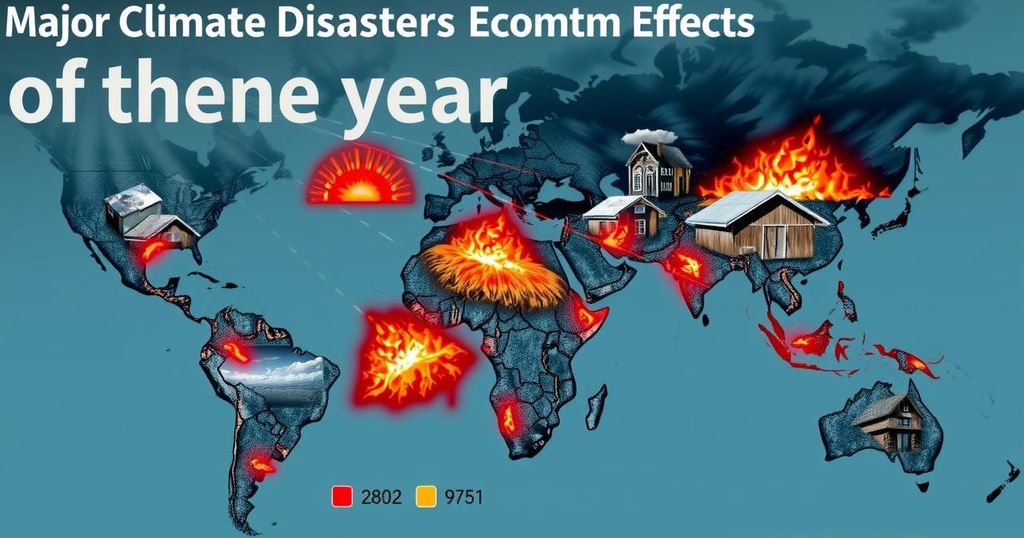Examining the 2024 Climate Disasters: Human and Economic Consequences

In 2024, climate disasters caused $229 billion in damages and 2,000 fatalities, predominantly in the United States. Hurricanes Helene and Milton were the costliest events, with each inflicting over $75 billion in losses. Meanwhile, Typhoon Yagi was the deadliest disaster, claiming 829 lives. The continued effects of climate change resulted in heightened storm intensity, with urgent calls for global leaders to act on climate commitments to support developing nations and mitigate future risks.
In 2024, climate disasters inflicted significant humanitarian and economic losses, amounting to $229 billion in damages and over 2,000 fatalities. A staggering three-quarters of these financial impacts were felt in the United States, predominantly from Hurricanes Helene and Milton, each causing losses exceeding $75 billion. The devastation continued worldwide, with typhoons and flooding incidents amplifying the effects of climate change.
For the first time since tracking commenced in 2018, two hurricanes caused losses greater than $50 billion within a single year. Hurricanes Helene and Milton, which struck the United States in September and October, were the most financially destructive disasters of the year. As climate change continues to exacerbate the frequency and severity of extreme weather events, such catastrophes are expected to rise.
Beyond economic ramifications, the human toll of climate disasters was profound, with Typhoon Yagi in Southeast Asia accounting for at least 829 deaths. Storm Boris claimed another 26 lives in Europe, while floods in Brazil and Valencia added to the tragedy. Less visible catastrophes, such as droughts in Africa and heat waves in Bangladesh, also inflicted severe damages, destabilizing food security and heightening health risks in vulnerable populations.
The scientific community attributes these extreme events to human activities responsible for climate change. According to Dr. Mariam Zachariah from Imperial College London, “Most of these disasters bear the clear imprint of climate change.” The escalation of storms, droughts, and heatwaves is closely linked with the relentless burning of fossil fuels. Nonprofit Christian Aid stresses the underreported costs of these disasters, particularly for impoverished regions lacking insurance.
Patrick Watt, the CEO of Christian Aid, called for immediate action from global leaders, stating, “Human suffering caused by climate change reflects political decisions.” The ongoing lack of commitment to lower emissions and provide assistance to the most affected countries exacerbates the global crisis. Developing nations, which contribute the least to global emissions, are disproportionately affected by climate change and lack the resources needed to recover.
The catastrophic events of 2024 underscore the urgent requirement for concerted efforts to combat climate change. While wealthy nations are increasingly facing climate-related challenges, developing countries remain severely impacted. Without immediate and effective action, the frequency and intensity of climate disasters are likely to escalate further.
Investing in climate resilience and curbing emissions presents opportunities to safeguard lives and economies. The report from 2024 serves as a sobering reminder of the consequences of climate change and the critical need for decisive global climate action as we approach 2025. By addressing the root causes and strengthening our infrastructures, we can mitigate risks and strive towards a sustainable future.
The context of this report reflects the widening ramifications of climate change, particularly emphasizing the economic and humanitarian toll stemming from extreme weather events. With climate change intensifying storms, droughts, and floods, the year 2024 serves as an alarming indicator of the growing frequency and severity of these disasters. Scientists and global organizations are increasingly urging world leaders to acknowledge the implications of their political decisions and corporate behaviors on the climate crisis, highlighting the need for urgent and comprehensive climate action across all nations.
The events of 2024 reveal a stark picture of the impacts of climate change, manifesting in both human suffering and economic distress. With unprecedented losses from climate disasters, it is clear that immediate action is necessary to address the ongoing crisis. Investing in resilience and committing to emissions reductions can create opportunities for recovery and stability. As we move into 2025, a renewed commitment to global climate action is essential to avert further irreversible damage to our planet and protect the most vulnerable communities.
Original Source: www.drivingeco.com








